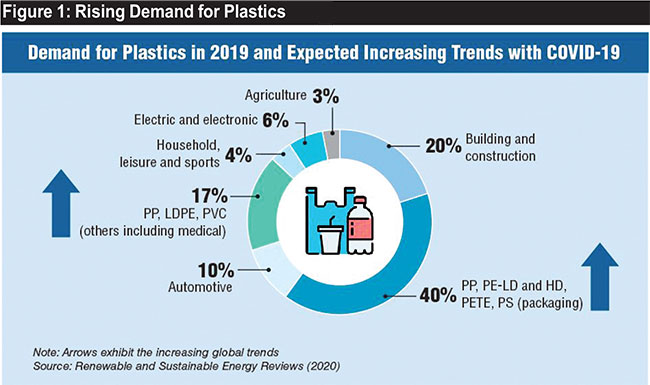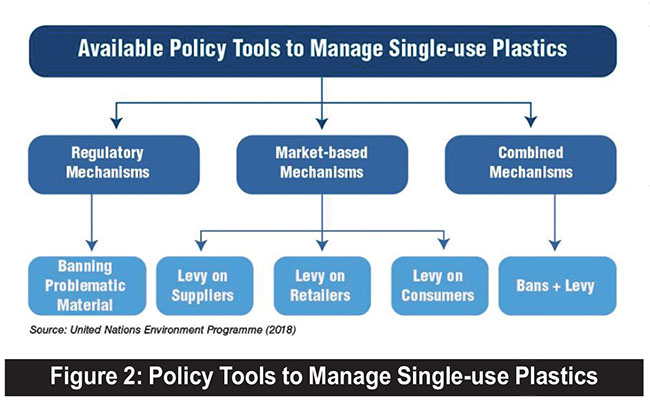Business
Plastic Pandemic: The ecological fallout of COVID-19 and policy options for Sri Lanka

by Ruwan Samaraweera
 The lockdowns introduced in 2020 to curb the spread of COVID-19 saw the narrative “nature is healing” gain prominence. However, the notion that nature, in the absence of people, was healing fizzled out fairly quickly with the emergence of fresh environmental challenges, most notably, the resurgence of single-use plastics. In fact, in the months following the lockdowns, reliance on plastics grew exponentially, with the scale of the negative environmental impacts far outweighing initial gains such as reduced air and noise pollution. This blog examines the ecological fallout of the pandemic and suggests policy options for Sri Lanka to avert the looming environmental disaster.
The lockdowns introduced in 2020 to curb the spread of COVID-19 saw the narrative “nature is healing” gain prominence. However, the notion that nature, in the absence of people, was healing fizzled out fairly quickly with the emergence of fresh environmental challenges, most notably, the resurgence of single-use plastics. In fact, in the months following the lockdowns, reliance on plastics grew exponentially, with the scale of the negative environmental impacts far outweighing initial gains such as reduced air and noise pollution. This blog examines the ecological fallout of the pandemic and suggests policy options for Sri Lanka to avert the looming environmental disaster.
The Plastic Pandemic
Plastics have several applications and offer undeniable benefits to consumers and producers due to specific, inherent properties. They are hygienic, lightweight, flexible and anti-corrosive. As such, plastics are among the most extensively-produced material globally with 359 million tonnes of plastics produced in 2018 alone. However, plastics have become a severe environmental concern due to haphazard disposal. Plastics include consumables like plastic bags, straws, cups, bottles etc., which are thrown away after being used just once, referred to as single-use plastics. Worldwide consumption of plastic bags ranges from 1 to 5 trillion annually, and almost 160,000 plastic bags are consumed per second globally.
Without even being a large consumer of plastics globally, Sri Lanka generates more than 5 million kilograms of plastic waste per day, where the per capita daily contribution is nearly 0.5 kg. Sri Lanka is already struggling to cope with the amount of plastic waste generated each year. Unless concrete measures are taken to alter the current manufacturing methods and consumption patterns of plastics, the situation could result in irreversible damage to the environment. The global threat of the COVID-19 pandemic makes the problem (ex: Styrofoam, aluminium cans, polystyrene etc.) even more challenging.
An Ugly Resurgence
The demand for plastic by medical and packaging sectors is increasing sharply compared to pre-pandemic conditions (Figure 1). For instance, an estimated 89 million medical masks, 76 million gloves and 1.6 million goggles are required monthly in the battle against the pandemic, according to the World Health Organization (WHO). As a result, researchers expect a 53.4% market growth for disposable facemasks over 2020-2027. The disposable facemasks are produced using polymers such as polypropylene (PP), polyurethane, polyacrylonitrile, polystyrene, polycarbonate, polyethylene (LDPE), or polyester, which are potential sources of microplastics.
Estimates illustrate that the demand for disposable syringes and plastic containers that store vaccines will be increased with nationwide vaccination efforts against COVID-19. As a result, the global market will experience a 7% compound annual growth rate and reach a value of USD 14.4 billion by 2030. Moreover, the demand for other personal protective equipment like face shields made from PP, LDPE gowns, vinyl gloves made from polyvinyl chloride (PVC) will increase sharply along with the plastic packaging material. Thus, the production and consumption of PP, LDPE and PVC material will exhibit an increasing trend.
Lockdowns and resulting online shopping and home delivery can escalate the demand for plastic, which is reflected by the accumulation of plastic wastes, especially from food packaging. In Thailand, plastic waste rose by 15% during the pandemic, primarily due to food packaging waste, resulting from tripled food delivery demand. During the pandemic, many governments worldwide banned the use of reusable cups and food utensils due to safety reasons since reusable commodities could be contagious. Scholars also predict a drastic increase in medical waste that includes single-use plastic and other environmentally problematic material.
For instance, in Hubei province, China, medical waste generation increased sharply, and by 9 March 2020, the country collected 468.9 tonnes of medical waste related to the pandemic. A more significant proportion of that waste is comprised of single-use plastics. Wuhan’s medical waste exceeded the maximum incineration capacity of 46 tonnes/day due to a dramatic rise in waste accumulation up to 240 tonnes/day. Hence, despite their detrimental impacts, managing the pandemic is linked with single-use plastics and other environmentally-harmful material.

Addressing environmental, economic, health, and socio-cultural issues related to single-use plastics and other damaging material requires identifying the most problematic single-use plastic and other material, evaluating the scale of the problem, identifying significant sources of pollution and potential impacts of mismanagement on the environment, human and animal health, and the economy. Various methods can reduce the harmful effects of single-use plastics and other environmentally problematic materials. However, the availability of alternatives is crucial to cut down the use effectively.
Voluntary reduction strategies
One of the key instruments for single-use plastic is voluntary reduction strategies. Those are based on consumption patterns, consumer and producer choices upon an increased understanding.
Awareness creation
Voluntary adjustments are facilitated by awareness creation among stakeholder groups which are a gradual and transformational process that changes consumer and producer behaviour.
Policy instruments
Policy instruments can be classified as regulatory and economic (market-based and a combination of regulatory and financial) instruments.
The principal legislation governing plastic pollution in Sri Lanka is the National Environmental Act No 47 of 1980, where Section 32 comprises the manufacture, sale and use of plastic and polythene. As previously mentioned, several amendments were made to the act to address the challenges in managing plastic waste. Lobbying from local industry and pressures from major exporting countries, and availability of alternatives remain significant challenges in implementing bans. However, as discussed earlier, single-use plastics have the lowest recyclability and highest disposable rates. Therefore, implementing a combined approach of levies, bans, and extended producer responsibility (EPR) wherever necessary would enhance the positive impacts.
Link to blog: https://www.ips.lk/talkingeconomics/2021/12/07/plastic-pandemic-the-ecological-fallout-of-covid-19-and-policy-options-for-sri-lanka/
Ruwan Samaraweera is a Research Officer at IPS, with a background in entrepreneurial agriculture. He holds a Bachelor’s in Export Agriculture from Uva Wellassa University of Sri Lanka. His research interests are in environmental economics, agricultural economics, macro-economic policy and planning, labour and migration, and poverty and development policy. (Talk to Ruwan – ruwan@ips.lk)
Business
AHK Sri Lanka champions first-ever Sri Lankan delegation at Drupa 2024

The Delegation of German Industry and Commerce in Sri Lanka (AHK Sri Lanka) proudly facilitated the first-ever Sri Lankan delegation’s participation at Drupa 2024, the world’s largest trade fair for the printing industry and technology. Held after an eight-year hiatus, Drupa 2024 was a landmark event, marking significant advancements and opportunities in the global printing industry.
AHK Sri Lanka played a pivotal role in organising and supporting the delegation, which comprised 17 members from the Sri Lanka Association for Printers (SLAP), representing eight companies from the commercial, newspaper, stationery printing, and packaging industries. This pioneering effort by AHK Sri Lanka not only showcased the diverse capabilities of Sri Lanka’s printing sector but also facilitated vital bilateral discussions with key stakeholders from the German printing industry.
Business
Unveiling Ayugiri: Browns Hotels & Resorts sets the stage for a new era in luxury Ayurveda Wellness

In a captivating reimagining of luxury wellness tourism, Browns Hotels & Resorts proudly unveiled the exquisite Ayugiri Ayurveda Wellness Resort Sigiriya. This momentous occasion, celebrated amidst a vibrant and serene grand opening on the 6th of June, heralds a new chapter in the Ayurveda wellness tourism landscape in Sri Lanka. Nestled amidst 54 acres of unspoiled natural splendour, Ayugiri features 22 exclusive suites and stands out as the only luxury Ayurveda wellness resort in the country offering plunge pools in every room, rendering it truly one-of-a-kind.
The grand opening of Ayugiri Ayurveda Wellness Resort was an enchanting event, where guests were captivated by the melodies of flutists and violinists resonating through Sigiriya’s lush landscapes. As traditional drummers and dancers infused the air with vibrant energy, Browns Hotels & Resorts’ CEO, Eksath Wijeratne, Kotaro Katsuki, Acting Ambassador for the Embassy of Japan and General Manager, Buwaneka Bandara, unveiled the resort’s new logo, marking a significant moment witnessed by distinguished guests from the French Embassy, Ayurveda and wellness enthusiasts along with officials from the Sigiriya area, LOLC Holdings and Browns Group.
“Our strategic expansion into wellness tourism with Ayugiri Ayurveda Wellness Resort Sigiriya symbolises a significant milestone for Browns Hotels & Resorts. Wellness tourism has consistently outperformed the overall tourism industry for over a decade, reflecting a growing global interest in travel that goes beyond leisure to offer rejuvenation and holistic well-being. By integrating the timeless wisdom of Ayurveda with modern luxury, we aim to set a new standard in luxury wellness tourism in Sri Lanka. Whether your goal is prevention, healing, or a deeper connection to inner harmony, Ayugiri offers a sanctuary for holistic well-being” stated Eksath Wijeratne.
Ayugiri encapsulates the essence of life, inspired by the lotus flower held by the graceful queens of the infamous Sigiriya frescoes. Just as the lotus emerges from the murky depths, untainted and serene,
Ayugiri invites guests on a journey of purity and rejuvenation, harmonised with a balance of mind, body and spirit, the essence of nature, echoes of culture and the wisdom of ancient Ayurvedic healing.
Business
HNB General Insurance recognized as Best General Bancassurance Provider in Sri Lanka 2024

HNB General Insurance, one of Sri Lanka’s leading general insurance providers, has been honored as the Best General Bancassurance Provider in Sri Lanka 2024 by the prestigious Global Banking and Finance Review – UK.
The esteemed accolade underscores HNB General Insurance’s unwavering commitment to excellence and its outstanding performance in the field of bancassurance. Through dedication and hard work, the HNB General Insurance team has continuously endeavored to deliver innovative insurance solutions, cultivate strong relationships with banking partners, and provide unparalleled service to customers nationwide. This recognition is a testament to the team’s dedication and relentless pursuit of excellence in the bancassurance business.
“We are honored to receive this prestigious award, which reflects our team’s tireless efforts and dedication to delivering value-added insurance solutions and exceptional service through our bancassurance partnerships,” said Sithumina Jayasundara, CEO of HNB General Insurance. “This recognition reaffirms our position as a trusted insurance provider in Sri Lanka and motivates us to continue striving for excellence in serving our customers and communities.”












